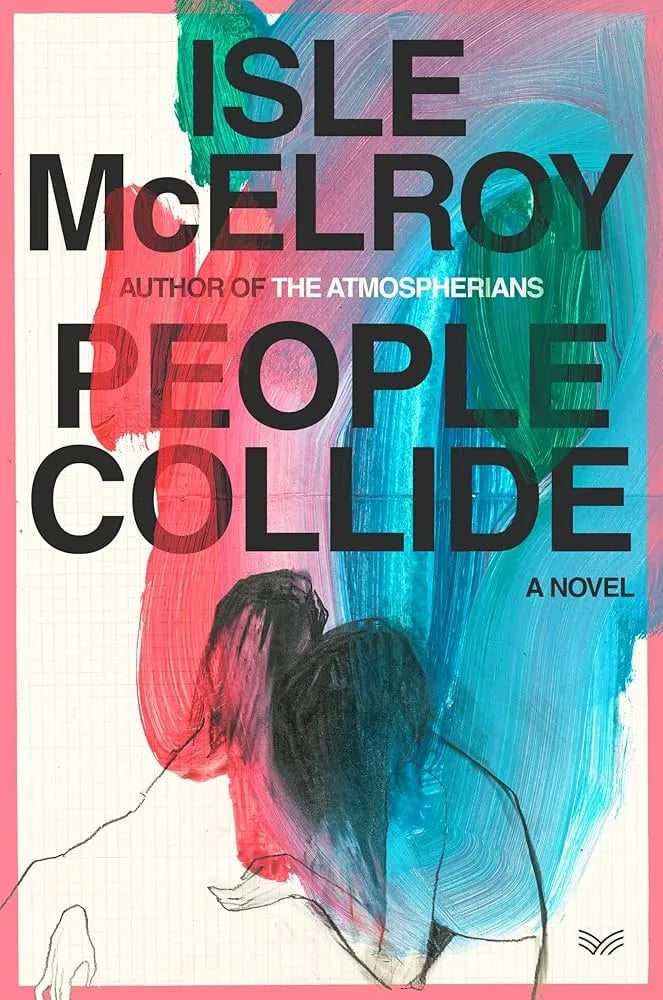*shaking fist at sky* GENDERRRRR
I do this every day at noon if you guys wanna join <3
I wrote a jingle for this post.
It goes “gender books, gender books, step right up for gender … booooooooooks!”
Just kind of set it to whatever music your heart tells you because it, like gender itself, is a made up thing entirely dependent on interpretation, performance, and collective agreement! Ok guys for real though, how’s it going? Yeah bad for me too.
People Collide is one of the weirdest, most interesting books I’ve read. One day the protagonist wakes up in his wife’s body. He presumes she is in his body now but is nowhere to be found. The commitment that McElroy has to exploring the premise, of the intimacy that would come from waking up in your partner’s skin and having to wash their hair and shave their legs, is impossible to look away from. I like the book’s exploration of a person’s relationship with a body when it becomes a transient thing, I like the mental paths it leads the character down, and I like the slight mystery that comes from wondering where the wife could possibly be.
Here’s the thing. HERE’S THE THING. I know some people are going to get turned off because this book has like, vampires and trolls and stuff in it but one of the things that I find the most compelling about Terry Pratchett’s Discworld series is that through a world populated with imps and dwarves and magic he finds the most incredible ways to explore issues like religious dogma, prejudice, and I’m maybe most impressed with how much this old British man who was born in the 1940s and grew up without indoor plumbing thought so deeply about the nature of gender.
His third book in the series, Equal Rites, is about the world’s first female Assigned Wizard at Birth. His portrayal of dwarfs started as what I suspect was a throwaway joke about all dwarfs having beards and using masculine pronouns and courtship being therefore a very nuanced process and ends up, over the course of many books, following a new generation who want to wear lipstick and use she/her pronouns and the blowback they face and the allies they find.
This entry isn’t about any of the dwarfs unfortunately because that’s like a five-book mini-arc which I can of course provide anyone who’s interested because it’s some of the best books anyway. Monstrous Regiment is a way easier pitch because it’s just one book that’s relatively standalone in the series and follows a girl whose backwards, hegemonic country is locked in an endless war they insist they’re winning even though they’re running out of men and food who disguises herself as a boy to enlist and find her brother on the battlefront. Her careful study into what makes someone a boy, as well as some whispered hints that come in the barracks late at night, making her wonder who exactly knows her secret, is something that makes me read this book at least once a year. I really can’t tell you any of the things that make this book so stunning without spoiling it so you’ll just have to trust me.
Also just for no reason including this account of Pratchett being a true ally for life.
Have you guys ever heard of Jack Sheppard? I hadn’t and boy did I feel silly because I thought he was just made up for this but he was a real guy! It’s kind of hard to tell at first because Confessions of the Fox is formatted like a long-lost manuscript documenting the life of Sheppard, an 18th century thief and escape artist (and revealing him to be trans) that is being read through and footnoted by a trans academic, himself being hawkishly watched by an oppressive publisher. This book is such a gorgeous period piece, drenched in that old London scuzziness of cramped alleyways and salty language. I really enjoyed the expansion of that, for lack of a better phrase, Oy Mista! You Me Dad? canon to include a whole different spectrum of lives that haven’t been historically included, plus a little bit of magical realism for flavor.
My headcanon is that this book is in the Is Space Gay cinematic universe because the ocean is also very queer, obviously. Like, look at coral. For real. This is probably the least feel-good nature book I’d ever recommend (for the record: Genius of Birds, An Immense World, Vesper Flights is what I would recommend for that). Several of the anecdotes are brutal and haunting. But Imbler does such a great job of capturing the aspirational unknowableness of the Sea Creature, a beautiful, shifting, at times cold and dark portrait of slippery defiance. One of the last essays talks about how creatures evolve over millions of years, picking up things they need and losing things they don’t but how none of us have that kind of time and the power that comes from making your body, and your life, what you need it to be right now while you can. I think about it a lot.




![How Far the Light Reaches: A Life in Ten Sea Creatures [Book] How Far the Light Reaches: A Life in Ten Sea Creatures [Book]](https://assets.buttondown.email/b0611638-bd55-4107-89d0-77f509115859_1696x2560.jpeg)